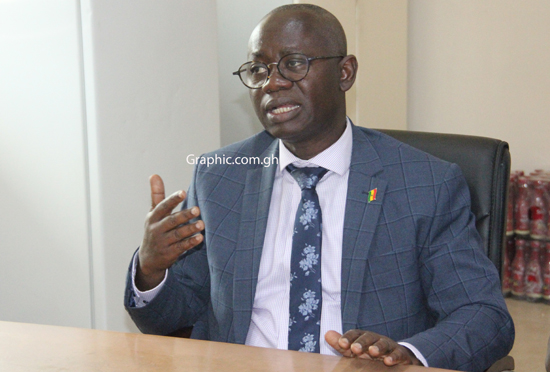
GES gives assurance of quality education under new bill
The Ghana Education Service (GES) says the Pre-Tertiary Education Bill before Parliament, if passed into law, will help improve on the quality of education and supervision.
It has, therefore, assured teacher unions that the bill will not, in any way, compromise the quality of education because the GES would continue to play the supervisory role.
In an interview in Accra yesterday, the Director-General of the GES, Professor Kwasi Opoku-Amankwa, gave an assurance that even though under the bill basic education would be ceded to the district assemblies, “the quality of education will not be compromised”.
“We will always set the parameters within which pre-tertiary education should be delivered,” he assured the teacher unions.
Teacher unions
Teacher unions in the country last week called on Parliament to suspend any further deliberations on the Pre-tertiary Education Bill until they (the unions) had resolved all outstanding issues with the Ministry of Education.
Advertisement
"This notice we serve the Parliament of Ghana. We wish to caution that should our stance be disregarded or ignored, we pre-tertiary education unions will advise ourselves accordingly," they warned.
The teacher unions, comprising the Ghana National Association of Teachers (GNAT), the National Association of Graduate Teachers (NAGRAT), the Teachers and Educational Workers Union (TEWU) and the Coalition of Concerned Teachers (CCT)-Ghana, said if the bill was passed, it would destabilise the teaching profession in that it would break or dismember the unified service currently in place, as well as break the unified conditions of service under which teachers worked.
Decentralisation and unionism
But Prof. Opoku-Amankwa disagreed with that assertion, explaining that it was all about how the unions would decide to organise themselves, adding that there were best practices elsewhere and even in the country regarding decentralisation.
He cited the formation of the Civil and Local Government Staff Association, Ghana (CLOGSAG), which comprises a number of union bodies, and the kind of power it wield as an example, stressing that no teacher could be forced to join other unions, because of the decentralisation, other than his or her mother union, such as GNAT, NAGRAT and CCT-G.
Supervisory role
Prof. Opoku-Amankwa explained that the National Inspectorate Board (NIB) would support the GES to play a supervisory role to ensure that the guidelines that “are given are adhered to for us to get the quality of education that we expect”, while the assemblies concerned themselves with the day-to-day running of the schools.
He disagreed with the unions that senior high schools would be managed by the regional coordinating councils, stressing that the unions had nothing to be worried about that because “there is nothing like that in the bill”.
He said the National Council for Curriculum and Assessment (NaCCA) would continue to develop the curriculum, assess and approve learning and teaching materials, while the GES, the National Teaching Council (NTC) and the NIB would continue to work together to ensure that quality was attained.
“We believe that once it is decentralised at the various levels, it becomes much smaller to supervise and so it will strengthen education delivery.
“Again, the responsibility, once it is decentralised, will now be each assembly’s to ensure quality for their own children because currently the situation that we have is top-down approach and almost everything has to come to Accra before it is decided on,” he explained.
Competition
Prof. Opoku-Amankwa said he believed that decentralising basic education would spur competition among the districts, with the potential to improve learning outcomes, as each assembly would work hard to ensure that its schools came tops.
“Usually, when the Basic Education Certificate Examination (BECE) results are released, some districts score zero and the blame game goes on. While some lay the blame on the doorstep of class teachers, others blame district or regional directors, and others the GES itself, and it goes on and on. But the children cannot wait; we cannot wait for them to fail for us to go on radio or TV to discuss it,” he posited.
He stressed that as far as the GES was concerned, “we believe that these things will not affect the quality of education because we will have more time to monitor the framework and the guidelines that we are developing”.
He said that would give the service more time to plan, develop strategies and work closely with the regions and districts to ensure that only the kind of quality education the country expected was delivered.
It is still a bill
Prof. Opoku-Amankwa used the opportunity to remind the teacher unions and the public that the bill remained as such, not an act, and advised them to make any input that they deemed fit.
“I believe that whatever input that could be made, this is the opportune time to make it,” he said, adding that that was what every Ghanaian would expect of them.
